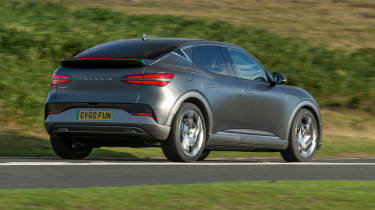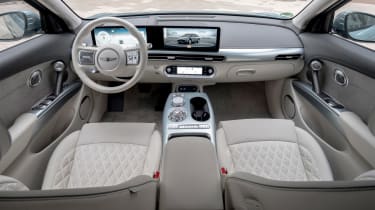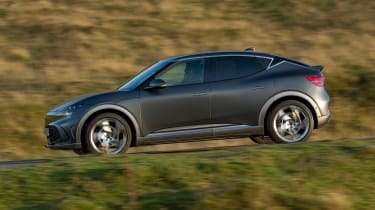Genesis GV60 Sport Plus 2023 review
It’s fast, luxurious and dynamically capable, but the GV60’s attributes just don’t quite mesh
Genesis has been quietly building up a range of premium rivals for BMW and Mercedes in their well-trodden executive car formats, but this new GV60 is something rather different. Rather than prescribing to a particular form, it seems to adopt all of them, all at once. This slightly high-riding electric crossover-cum-coupe has a fierce 483bhp dual-motor powertrain, a plush and luxurious interior, and a ‘Drift Mode’. Try categorising that one…
GV60s start at £53,905, but this top-spec Sport Plus model is almost fully loaded at £67,505. Regardless of trim, all sit on a foundation of Hyundai/Kia’s e-GMP bespoke electric platform. This means the usual skateboard chassis with a 77.4kWh battery pack under the cabin with e-motors mounted on the axles. The suspension is of a relatively simple MacPherson strut front and multi-link rear design, paired with coil springs and adaptive dampers.
Entry-level GV60s come with just one motor mounted on the rear axle, with a mid-level model doubling that motor on the second axle, but this dual-motor Sport Plus variant upsizes the rear e-motor to produce combined figures of 429bhp and 446lb ft, rising to 482bhp and 516lb ft in the temporary Boost mode that’s activated by a button on the steering wheel.
These are some way off the closely related Kia EV6 GT’s 569bhp, but the GV60 still has strong acceleration, reaching 62mph in 4.0sec. Range is less impressive, which for the Sport Plus model is estimated at just 228 miles with a full battery – this is down to the relatively small battery pack. Genesis quotes a 2145kg weight figure, which is what many EVs of this size hit the scales at.
In our experience, the GV60’s already limited range was just about achievable despite the cold weather, using an average power consumption of around 2.5miles/kWh. It does come with a cutting-edge 800V electrical system that facilitates up to 350kW charging – which for now is about as fast as it gets if you can find a public charger capable of those speeds.
As you walk up to the GV60, it can be a little tricky to contextualise size-wise as its overall dimensions are just so weird. It’s shorter than a BMW 2-series Coupe, about as wide as an X3 (give or take a few millimetres), yet has a comparatively long 2900mm wheelbase. These don’t correlate to any rivals, but do seem to liberate plenty of space inside the cabin – something that’s accentuated by the flat floor and good forward visibility.
In the case of our specific test car, the GV60 felt very opulent, pairing matt white exterior paint with an elegant off-white interior full of quilted Nappa leather, soft-touch faux suede and that reflective fabric cyclists wear at night. The cabin itself is also full of quirky details – some of them clever, such as the draw-like glovebox, some of them not, such as the rotating spherical gear selector. You certainly won’t be bored by it, more importantly the quality is good and the ergonomics sound. If there is one caveat to the experience inside it would be the odd steering wheel that forces you to take a 10-and-2 position with your hands.
So far, a quirky spirit has been the defining element to the GV60, but unfortunately the same has to be said of the way that it drives. The ride is just too firm, and small bumps are easily transmitted into the cabin through those chunky 21-inch wheels and tyres. Body control is good, especially when considered next to a traditional SUV, but there’s just not much enjoyment to be had in driving the GV60 quickly, so the compromise of a fluid ride for the sake of secure high-speed body control doesn’t feel like the right one.
The steering is lifeless yet is at least consistent, but the same can’t really be said for the throttle and brake pedal calibration. Put your foot down and its acceleration is unrelenting, but come off the throttle quickly and the drawdown of volts to the wheels doesn’t always correlate, giving it a sort of runaway train feeling. The brakes are powerful enough, but there’s next to no feel, which can also be a little uncomfortable when trying to wipe off speed in a two-ton-plus car.
It’s not just the pedals that feel a bit muddled, but the actual power delivery, too. There doesn’t seem to be any consistency as to which motor will provide drive mid-corner, making it difficult to anticipate where the power’s going to come from. This, as well as many other elements of the driving experience, make the GV60’s character feel undefined, like engineers weren’t quite sure what car this was meant to be and therefore didn’t know which direction to take in its set-up.
It’s by no means a bad car, in fact the GV60 is the best Genesis on sale in the UK – it’s just not resolved. This might be something that’s better with the entry-level models which focus more on comfort and less on dynamic capability, but as a high-riding, high-performance crossover the Sport Plus doesn’t make a very solid case for itself.
Prices and rivals
The GV60 Sport Plus is priced from £67,505, putting it in the firing line of a few electric rivals that are different in shape, but similar in versatility. It’s well equipped from standard, with a good set of high-resolution displays with both physical and touch controls, giving you plenty of ways to interact with the embedded systems. For a glass roof, adaptive headlights or a high-end B&O stereo you will need to tick a few boxes, though.
For us, the most impressive current EV at around that price point is the BMW i4. The M50 is rapid and drives extremely well for a heavy EV, but comes with similar issues in its limited 200- to 220-mile range. If you simply must have an SUV, the entry-level BMW iX is priced from just under £70,000 but also has its own range issues. But, it’s a superb example of BMW’s engineering might, and despite some challenging looks makes for a superb luxury car.





